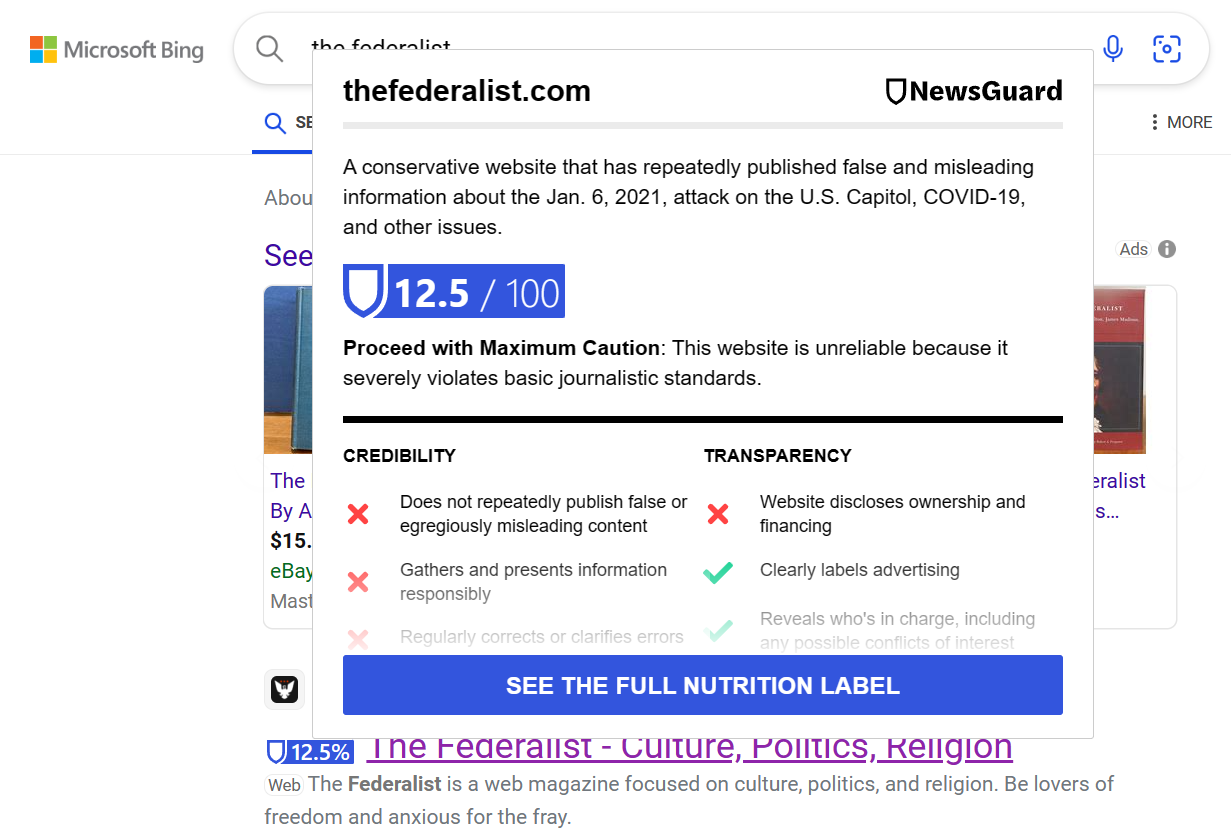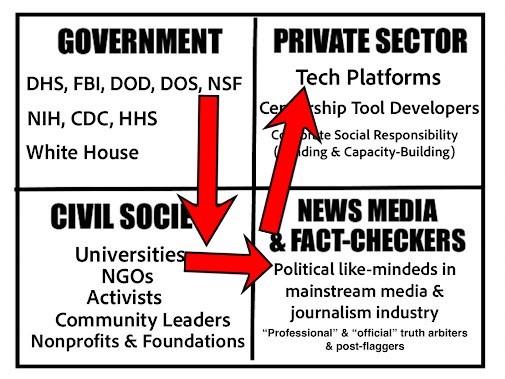SUMMARY
- Establishment media companies are facing a decline in their dominance due to competition from decentralized media.
- Some media figures have used recent layoffs at news companies to claim the industry is facing a crisis.
- In the U.S., these efforts have coalesced around the Journalism Competition and Preservation Act (JCPA), which would funnel money from Big Tech to the media industry, while excluding independent competitors.
- Establishment media companies already receive billions of dollars in subsidies from tech companies and governments around the world, but industry lobbyists still claim the bill is needed to save the industry.
- The bill has attracted the support of the censorship industry, which presents the establishment media as a bulwark against alleged mis- and dis-information.
Recent layoffs in the establishment media, in particular the 100-plus employee downsizing at the Los Angeles Times, as well as tumbling traffic rates for mainstream news websites, has led to a public debate on the future of journalism.
The establishment media has also taken the opportunity to renew calls for Congress to revive a narrowly-blocked bill to bail our the industry, one that is fully backed by the censorship industry: the Journalism Competition and Preservation Act (JCPA).
Much like the Online News Act in Canada, and the News Media Bargaining Code in Australia, the JCPA would open up a state-mandated funnel of advertising revenue from Silicon Valley to the nation’s largest media conglomerates.
The JCPA accomplishes this by establishing a corporate media cartel, which can collectively bargain for payouts from Silicon Valley companies. The latter would not have a choice in the matter: the bill allows for agreements to be forced on them through arbitration. Like the Canadian and Australian bills, the JCPA creates a stream of income for establishment media companies that is virtually guaranteed.
Keeping Out The Competition
Although presented as a means to rescue “journalism,” the bill in fact only protects the establishment media against its independent competitors. Two important bottlenecks in the bill exclude new and independent media, such as podcasters, streamers, and online newsletter authors.
The first bottleneck consists of licenses: any organization that wishes to form a media cartel or join an existing one must either be an “eligible broadcaster” with a license issued by the FCC, or own a “qualifying publication” that is either owned by a 503(c) nonprofit, or possesses an International Standard Serial Number (ISSN) prior to the bill’s passage.
Since the vast majority of independent online media creators meet none of these criteria, they would be excluded from the cartel. State-mandated payouts from Silicon Valley would instead flow into the coffers of establishment-friendly outlets owned by conglomerates like Hearst and Gannett.
The second bottleneck consists of entry criteria that the media cartels write themselves. The JCPA allows any two media companies to form a cartel, and gives them a free hand to establish entry criteria for others that wish to become members. The only criteria which cannot be used as grounds for exclusion, per the bill, are the “size or viewpoint” of a publication.
That leaves a lot of wiggle room. A media cartel could easily insert a condition of entry that includes the alleged “reliability” of a publication, a viewpoint-neutral criteria that is frequently used as a tool to discredit and censor independent media. Numerous organizations, all claiming to be “viewpoint neutral,” currently employ the “reliability” pretext to maintain blacklists of disfavored media. These include the Global Disinformation Index (GDI) and NewsGuard, both familiar names in the censorship industry.
News outlets that challenge official narratives are likely to end up on the blacklists, which NewsGuard and GDI then use to get them blacklisted or downgraded by advertisers, social media companies, and even American classrooms in order to delegitimize, financially devastate, and even de-platform the independent media.
Should the JCPA pass, it is quite possible that one of these organizations will be relied on to determine which media outlets are “reliable” enough to join the media cartel, and which should be left out in the cold – which is perhaps why NewsGuard vocally supports the JCPA.
In its statement, NewsGuard specifically cited the problem of “misinformation” and the media’s role in fighting it:
The digital platforms have allowed misinformation and hoaxes to be hugely popular on social media and in search results. The platforms fail to provide their users with tools to tell the difference between high-quality journalism and purveyors of misinformation. It’s time the trustworthy news publishers of all stripes are allowed to join forces to push back against these irresponsible platforms and re-establish sustainable revenue models to support newsrooms across the country.
In a comment to Breitbart News in October 2022, amid an intense push to add the JCPA to the National Defense Authorization Act (NDAA), NewsGuard co-founder Gordon Crovitz said he hoped his company’s blacklist would be used to limit membership in the JCPA’s media cartel:
In the case of whether the Silicon Valley platforms should pay market rates for the value they receive from the work of journalists, it’s understandable that both the platforms and publishers would look for ways to exclude from required payments sites that are only masquerading as news sites, such as Russian, Chinese and Iranian government disinformation sites and the thousands of healthcare hoax sites that we have identified.
NewsGuard’s criteria for smearing news websites as low-quality, or carriers of misinformation, are far broader than just “Chinese and Iranian disinformation.” For example, the mainstream conservative website The Federalist is given an abysmally low rating of 12.5 out of 100 because it questioned establishment narratives on COVID-19 and January 6.
When users have NewsGuard’s browser extension installed, any link to the Federalist is overlaid with a giant warning to “proceed with maximum caution.”

If the JCPA is passed, NewsGuard hopes that these tilted ratings will become the standard that determines access to the resulting media cartels.
The News Media Alliance, the primary lobbying force behind the JCPA, is similarly aware of how the “misinformation” narrative benefits its goals. In July 2020, when Facebook was facing an ad boycott whipped up by the Anti-Defamation League and other pro-censorship organizations, the organization ran an ad encouraging advertisers to bring their business to the legacy media instead:
Dear Facebook Advertisers:
Worried about your ads appearing next to disinformation, misinformation or hate speech?
Our journalism is written and edited by professionals. We take responsibility for what we do.Our audiences continue to grow. The public wants and needs quality news and information more than ever.
The JCPA has yet to pass in the United States – but that’s not for lack of trying. Years of work by media lobbyists paid off at the end of 2022, when the provisions of the JCPA were added to the National Defense Authorization Act (NDAA). A last-minute counteroffensive led by Breitbart News, then-GOP leader Kevin McCarthy and several Republican Senators prevented the JCPA from making it into the final draft, but the fact that it went as far as the NDAA shows just how big of a deal this bill is for Washington.
Media lobbyists clearly believe the JCPA can be passed. In September, thousands of representatives from newsrooms across the country flew into Washington D.C. to urge lawmakers to pass the bill. Much will depend on the man who replaced McCarthy as Speaker of the House, Rep. Mike Johnson (R-LA), who, like his predecessor, has the power to block this bill.
Formalizing a Rigged Game: Media Protection Laws Around The World
Thanks to combined pressure from the censorship industry – NGOs, government agencies, and the media itself – tech companies already provide favorable treatment to the traditional media. Curated feeds featuring stories from the legacy media can be found on Apple, Google, and Microsoft owned platforms.
In addition to prioritization in algorithms, tech companies also inject cash into the traditional media. In 2021, it was reported that Meta planned to pay over $1.5 billion to news companies over a half-decade, with little information disclosed on which companies received the payouts and in what amounts. In addition to rigging its algorithms to favor the mainstream media, Google also proudly boasts of its billion-dollar investments in traditional media around the world.
This has not satisfied the media industry and its allies. The JCPA is just one component of a worldwide effort to prop up the legacy media with Big Tech cash. As previously mentioned, both Australia and Canada have passed laws (the News Media Bargaining Code in the former and the Online News Act in the latter) forcing tech companies to offer payments to media companies in exchange for carrying their content. Canada’s liberal government also directly funded the media with $600 million in subsidies.
It’s instructive to consider who’s left out of these laws. Media lobbyists have argued that social media profits from their content and the traffic it generates. But social media companies profit far more from the billions of users who casually produce content on their platforms every day, as well as the vast decentralized ecosystem of professional and semi-professional creators: newsletter authors, streamers, independent Rumble or YouTube channels and a variety of other forms.
Not only are these creators totally left out of laws like the JCPA, but they are also offered no safeguards against arbitrary demonetization and censorship by tech platforms, payment processors, and advertisers. The bottom line of these laws is protectionism: maximum benefits for the traditional media, and zero for the independent creators who compete with it.
The Media’s Role In The “Whole-Of-Society” Censorship Industry Framework
The censorship industry doesn’t just aim to suppress disfavored sources – it also wants to promote favored ones. A key objective of the online censorship industry is to rig the game in favor of the mainstream media – steering people into its traffic, shoring up perceptions of its trust and legitimacy, and propping up its profits.
The media is one of the four pillars of the censorship industry’s “whole of society” framework for combating disinformation. In this framework, the media and professional fact checkers act as arbiters of truth, signaling which narratives are to be promoted and which ones suppressed. Examples include RussiaGate, mail-in ballots, COVID-19, the Ukraine war.
Much of this originates with the government. An FFO report earlier this year explained how the National Science Foundation (NSF) funded a “digital dashboard” to “help journalists detect misinformation, correct misinformation, [and] share message interventions containing the verifiable truth into misinformation networks.” In addition to the government funding the creation of a massive database of American citizens (or “misinformation tweeters, misinformation retweeters, misinformation followers and misinformation followees,” as the NSF put it), it was also explicitly designed to give marching orders to journalists.

The media upholds the official worldview that “disinformation” threatens. When disinformation is eliminated, that official worldview will be all that remains, dominating public perception as it did in the pre-digital age, when centralized media companies controlled the only meaningful access points to news. The censorship industry arose in large part as a response to the digital disruption of that ecosystem, and the political consensus it underpinned.
The censorship industry and its political allies recognize that the situation is precarious. Trust in the media is consistently low, and young people have a growing inclination to trust posts on social media over traditional media organizations. This puts the traditional media in a race against time. Can it suppress its decentralized online competitors before it is eclipsed by them?





